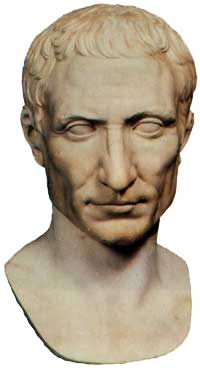Brief Background
![]()
Julius Caesar
 "Beware
the ides of March," was what the fortuneteller had whispered in Julius
Caesar's ear. "I have seen many warnings of danger in your future." But
Caesar, confident of his power in early 44 B.C., simply went on about his
business. He was even bold enough to dismiss his bodyguards. However, March 15,
referred to in the Roman calendar as the "ides" of March, turned out to
be the day of Caesar's gruesome death.
"Beware
the ides of March," was what the fortuneteller had whispered in Julius
Caesar's ear. "I have seen many warnings of danger in your future." But
Caesar, confident of his power in early 44 B.C., simply went on about his
business. He was even bold enough to dismiss his bodyguards. However, March 15,
referred to in the Roman calendar as the "ides" of March, turned out to
be the day of Caesar's gruesome death.
As Caesar entered into the place of the senate that day, a group of men gathered
around him as if to pay their respects. One of them took hold of Caesar's robe
and said, "Friends, what are you waiting for?" That was the signal to
attack. They drew their daggers from their robes and began stabbing Caesar. He
tried to defend himself, but then he recognized one of the men. It was Brutus, a
man Caesar thought was his friend.
"Et tu, Brute?" ("You too, Brutus?") Caesar asked.
He realized that even his friend had turned against him, and he stopped
resisting. Caesar fell to the floor and died. He had been stabbed 23 times.
Brutus jumped up, waving his bloody knife. He announced that he and his men had
saved the Roman Republic by killing Caesar. However, the death of Caesar did not
restore the Republic. Instead, it ushered in 13 years of civil war as various
groups struggled to control Rome.
Caesar had seized control of the government of the Roman world in 49 B.C.,
making himself dictator for life. As dictator, Caesar seemed to have little
respect for the constitution. According to the constitution, a Roman leader was
supposed to share power with the senators. But many senators thought Caesar
acted as if he were above the law. They thought he treated them as servants.
They saw his behavior as haughty and insulting. Many began to think of him as
both a personal enemy and an enemy of the Roman Republic.
Senators and other Roman citizens whispered among themselves that Caesar
intended to make himself king. If he did so, he could establish a dynasty. His
family line would rule the Roman world even after his death, and the Senate
would then have no role in choosing the next leader. Outraged, more than 60
senators met secretly. They planned how they would assassinate Caesar and murder
him for political reasons. One leader of the group was Brutus, the so-called
friend of Caesar.
When Brutus and his men killed Caesar on the ides of March, they thought they
had saved the Republic. But by the end of that day, the assassins had to hide
from angry mobs of Roman citizens. Many were outraged by Caesar's murder. Caesar
was well liked because he made many reforms that improved people's lives. For
example, he reorganized the government and lowered taxes. He founded new
colonies and gave people land to farm. He hired people to build temples and
public buildings. He made citizens of many people in the colonies.
 A power struggle followed Caesar's death. Caesar's adopted son Octavian acquired
such influence that Antony and Lepidus took him into their triumvirate. He
defeated his rivals in 31 B.C. and led Rome into a new era.
A power struggle followed Caesar's death. Caesar's adopted son Octavian acquired
such influence that Antony and Lepidus took him into their triumvirate. He
defeated his rivals in 31 B.C. and led Rome into a new era.
See Image of Mark Antony
![]()
![]()
Read The Bible
- 1599 Geneva Bible (GNV)
- 21st Century King James Version (KJ21)
- American Standard Version (ASV)
- Amplified Bible (AMP)
- Amplified Bible, Classic Edition (AMPC)
- Authorized (King James) Version (AKJV)
- BRG Bible (BRG)
- Christian Standard Bible (CSB)
- Common English Bible (CEB)
- Complete Jewish Bible (CJB)
- Contemporary English Version (CEV)
- Darby Translation (DARBY)
- Disciples’ Literal New Testament (DLNT)
- Douay-Rheims 1899 American Edition (DRA)
- Easy-to-Read Version (ERV)
- English Standard Version (ESV)
- English Standard Version Anglicised (ESVUK)
- Evangelical Heritage Version (EHV)
- Expanded Bible (EXB)
- GOD’S WORD Translation (GW)
- Good News Translation (GNT)
- Holman Christian Standard Bible (HCSB)
- International Children’s Bible (ICB)
- International Standard Version (ISV)
- J.B. Phillips New Testament (PHILLIPS)
- Jubilee Bible 2000 (JUB)
- King James Version (KJV)
- Lexham English Bible (LEB)
- Living Bible (TLB)
- Modern English Version (MEV)
- Mounce Reverse Interlinear New Testament (MOUNCE)
- Names of God Bible (NOG)
- New American Bible (Revised Edition) (NABRE)
- New American Standard Bible (NASB)
- New American Standard Bible 1995 (NASB1995)
- New Catholic Bible (NCB)
- New Century Version (NCV)
- New English Translation (NET)
- New International Reader's Version (NIRV)
- New International Version - UK (NIVUK)
- New International Version (NIV)
- New King James Version (NKJV)
- New Life Version (NLV)
- New Living Translation (NLT)
- New Matthew Bible (NMB)
- New Revised Standard Version (NRSV)
- New Revised Standard Version Catholic Edition (NRSVCE)
- New Revised Standard Version, Anglicised (NRSVA)
- New Revised Standard Version, Anglicised Catholic Edition (NRSVACE)
- New Testament for Everyone (NTE)
- Orthodox Jewish Bible (OJB)
- Revised Geneva Translation (RGT)
- Revised Standard Version (RSV)
- Revised Standard Version Catholic Edition (RSVCE)
- The Message (MSG)
- The Voice (VOICE)
- Tree of Life Version (TLV)
- World English Bible (WEB)
- Worldwide English (New Testament) (WE)
- Wycliffe Bible (WYC)
- Young's Literal Translation (YLT)
Main Menu
- Ancient Assyrian Social Structure
- Ancient Babylonia
- Ancient Canaan During the Time of Joshua
- Ancient History Timeline
- Ancient Oil Lamps
- Antonia Fortress
- Archaeology of Ancient Assyria
- Assyria and Bible Prophecy
- Augustus Caesar
- Background Bible Study
- Bible
- Biblical Geography
- Fallen Empires - Archaeological Discoveries and the Bible
- First Century Jerusalem
- Glossary of Latin Words
- Herod Agrippa I
- Herod Antipas
- Herod the Great
- Herod's Temple
- High Priest's in New Testament Times
- Jewish Literature in New Testament Times
- Library collection
- Map of David's Kingdom
- Map of the Divided Kingdom - Israel and Judah
- Map of the Ministry of Jesus
- Matthew Henry Bible Commentary
- Messianic Prophecy
- Nero Caesar Emperor
- Online Bible Maps
- Paul's First Missionary Journey
- Paul's Second Missionary Journey
- Paul's Third Missionary Journey
- Pontius Pilate
- Questions About the Ancient World
- Tabernacle of Ancient Israel
- Tax Collectors in New Testament Times
- The Babylonian Captivity
- The Black Obelisk of Shalmaneser
- The Books of the New Testament
- The Court of the Gentiles
- The Court of the Women in the Temple
- The Destruction of Israel
- The Fall of Judah with Map
- The History Of Rome
- The Incredible Bible
- The Jewish Calendar in Ancient Hebrew History
- The Life of Jesus in Chronological Order
- The Life of Jesus in Harmony
- The Names of God
- The New Testament
- The Old Testament
- The Passion of the Christ
- The Pharisees
- The Sacred Year of Israel in New Testament Times
- The Samaritans
- The Scribes
Ancient Questions
- Why Do the Huldah Gates Appear Different in Ancient Replicas and Modern Photos?
- What Is the Origin of the Japanese and Chinese Peoples? A Biblical Perspective
- How did the ancient Greeks and Romans practice medicine and treat illnesses?
- What were the major contributions of ancient Babylon to mathematics and astronomy?
- How did the ancient Persians create and administer their vast empire?
- What were the cultural and artistic achievements of ancient India, particularly during the Gupta Empire?
- How did ancient civilizations like the Incas and Aztecs build their remarkable cities and structures?
- What were the major trade routes and trading practices of the ancient world?
- What was the role of slavery in ancient societies like Rome and Greece?
- How did the ancient Mayans develop their sophisticated calendar system?
Bible Study Questions
- Why Do Christians Celebrate Christmas?
- How Many Chapters Are There in the Bible?
- The Five Key Visions in the New Testament
- The 400-Year Prophecy: Unpacking Genesis 15 and the Journey of a People
- The Authorized (King James) Version (AKJV): Historical Significance, Translation Methodology, and Lasting Impact
- Exploring the English Standard Version (ESV): Its Aspects, Comparisons, Impact on Biblical Studies, and Church Use
- A Detailed Historical Analysis of Language Updates in the KJ21: Comparison with Other Versions
- A Detailed Historical Analysis of the American Standard Version (ASV): Comparison to the King James Version, Influence on Later Translations, and Evaluation of Strengths and Weaknesses
- A Detailed Historical Analysis of Amplifications in the Amplified Bible (AMP) and Its Comparison to Other Bible Translations
- Detailed Historical Analysis of the Amplified Bible Classic Edition (AMPC): Examples of Amplifications and Comparative Analysis with Other Bible Translations
About
Welcome to Free Bible: Unearthing the Past, Illuminating the Present! Step into a world where ancient history and biblical narratives intertwine, inviting you to explore the rich tapestry of human civilization.
Discover the captivating stories of forgotten empires, delve into the customs and cultures of our ancestors, and witness the remarkable findings unearthed by dedicated archaeologists.
Immerse yourself in a treasure trove of knowledge, where the past comes alive and illuminates our understanding of the present.
Join us on this extraordinary journey through time, where curiosity is rewarded and ancient mysteries await your exploration.
Recent posts
-

Best gemstones for stud earrings for 15 years girl
Selecting the perfect pair of stud earrings for a 15-year-old girl is an exciting yet thoughtful process. Stud earrings are a timeless accessory, offe... -

Prayers for Prophets: A Reflection on Reverence and Intercession
Prophets hold a revered status across many of the world’s major religions. As individuals chosen to convey divine messages, they are often remembere... -

How Machine Learning is Reducing Risk in Automated Trading
In today’s fast-paced monetary markets, automated buying and selling has come to be a cornerstone of current making an investment. Algorithms now ex... -

Timur Turlov: Driving Global Investment Innovation Through Freedom Holding Corp.
Timur Turlov leads Freedom Holding Corp. (NASDAQ: FRHC) as its CEO where he connects technology with finance and global markets. Turlov established Fr... -

AI in the Legal Industry: Can Algorithms Replace Lawyers?
The legal career is historically considered as a discipline rooted in human judgment, nuance, and vital questioning. But in recent years, Artificial I...
